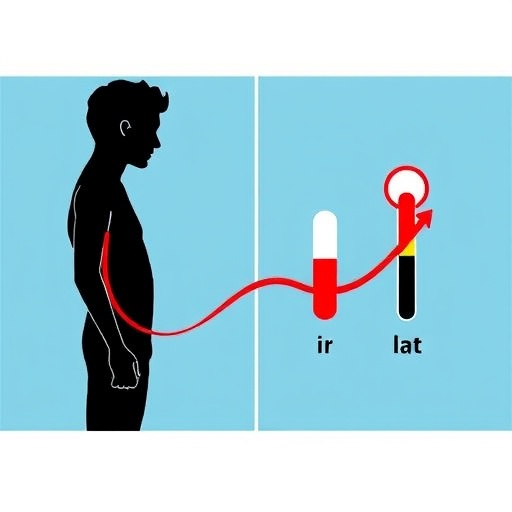In a groundbreaking study that sheds light on a pressing health issue, researchers from Uganda have delved into the prevalence of erectile dysfunction (ED) among diabetic patients in Western Uganda. Conducted across three selected clinics, this multicenter research highlights the alarming intersection between diabetes and sexual health, revealing critical insights into the prevalence of ED among this vulnerable population. The findings pose important questions regarding the broader implications of diabetes management and the quality of life for individuals affected by this chronic condition.
Erectile dysfunction is increasingly recognized as a common complication of diabetes, impacting a significant portion of the diabetic population worldwide. The multifaceted nature of this relationship is underpinned by the physiological effects of diabetes on blood flow, nerve function, and hormonal balance, all of which are crucial for maintaining erectile function. This correlation presents a troubling scenario, particularly in regions where diabetes is on the rise, such as in parts of Africa.
The objective of the study was to assess the prevalence of erectile dysfunction in men with diabetes living in Western Uganda, while also identifying associated risk factors. The researchers recruited diabetic men from a diverse range of age groups, ensuring a comprehensive sample that would reflect the broader diabetic community. Through rigorous data collection methods, including detailed patient questionnaires and clinical assessments, the study aimed to produce robust, clinically relevant data.
Findings from the study highlighted that erectile dysfunction was alarmingly prevalent among diabetic patients, with nearly half of the participants reporting the condition. This staggering statistic raises flags regarding the urgency of addressing sexual health as part of diabetes care. The study not only quantified the prevalence but also analyzed relevant factors contributing to the condition, including duration of diabetes, age, and levels of glycemic control. Such factors are critical for understanding the complexities surrounding ED in diabetic populations.
The impact of poor glycemic control cannot be overstated. Elevated blood sugar levels over time can significantly damage the vascular and nerve systems essential for erectile function. This deterioration often manifests in sexual dysfunction, thereby hindering the emotional and psychological well-being of affected individuals. The implications are profound, suggesting that improved diabetes management may play a pivotal role not just in prolonging life but enhancing the quality of life through better sexual health.
Furthermore, the social stigma surrounding erectile dysfunction often exacerbates the problem, particularly in conservative societies where discussions of sexual health remain taboo. Men experiencing ED may feel isolated, reluctant to seek help or engage in dialogues about their condition. The study’s findings provide a crucial impetus for healthcare providers to foster open conversations surrounding sexual health in clinical settings, allowing for better support and treatment options for patients.
The importance of early detection and intervention cannot be ignored. As diabetic patients may not readily recognize early signs of erectile dysfunction, healthcare providers must be proactive in screening and discussing potential symptoms with their patients. Education and awareness campaigns about the link between diabetes and sexual health would empower patients to seek help sooner, leading to timely management and possible reversal of symptoms.
On the treatment front, the study underlines an urgent need for tailored therapeutic approaches that address both diabetes and its complications, including erectile dysfunction. Pharmacotherapy, lifestyle modifications, and psychological support are all vital components of an effective treatment plan. In this respect, collaborative care between endocrinologists, general practitioners, and mental health professionals is essential. This multidisciplinary approach could lead to better outcomes and enhance the overall well-being of affected men.
The researchers also acknowledged the limitations of their study, including the reliance on self-reported data, which can sometimes be subject to biases or inaccuracies. Descriptive studies such as this are pivotal in highlighting areas that require more attention, prompting future research to delve deeper into the nuances of erectile dysfunction within diverse populations. Longitudinal studies will be particularly important in understanding how changes in diabetes management over time can influence sexual health outcomes.
The findings from this study resonate beyond the confines of Western Uganda, contributing valuable insights to the global conversation on diabetes and erectile dysfunction. As diabetes rates continue to rise worldwide, understanding its implications for sexual health is essential. Public health initiatives should strive to integrate sexual health education into diabetes care, emphasizing the interconnectedness of physical and emotional health.
In conclusion, the study serves as a wake-up call to the medical community, inviting a re-examination of standard diabetes care protocols to incorporate assessments of sexual health. Such changes could mitigate the profound effects of erectile dysfunction on the quality of life of diabetic patients, ultimately leading to more holistic approaches to diabetes management. Through increased awareness, improved communication, and innovative treatment strategies, healthcare professionals have the potential to transform the narrative around diabetes and its complications, ushering in an era of comprehensive patient-centered care.
Recognizing the pressing need for continued research and advocacy, this study marks an important step forward in understanding the intricate relationship between diabetes and erectile dysfunction. As healthcare providers work to improve outcomes for individuals with diabetes, exploring the realm of sexual health could redefine what it means to live well with this chronic condition, allowing for not just longer lives, but lives rich in fulfillment and intimacy.
Subject of Research: Erectile Dysfunction in Diabetic Patients
Article Title: Erectile dysfunction among diabetic patients in Western Uganda: prevalence and associated factors in a multicentre study across three selected clinics.
Article References:
Mswelo, V.E., Kibuuka, A., Shinkafi, T.S. et al. Erectile dysfunction among diabetic patients in Western Uganda: prevalence and associated factors in a multicentre study across three selected clinics.
BMC Endocr Disord 25, 238 (2025). https://doi.org/10.1186/s12902-025-02048-2
Image Credits: AI Generated
DOI: 10.1186/s12902-025-02048-2
Keywords: Erectile Dysfunction, Diabetes, Prevalence, Sexual Health, Western Uganda, Multicenter Study




